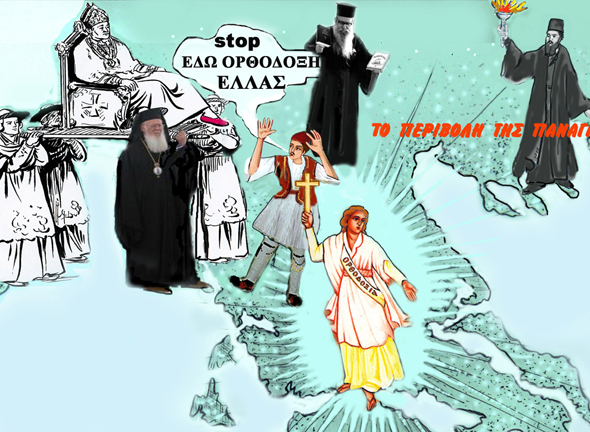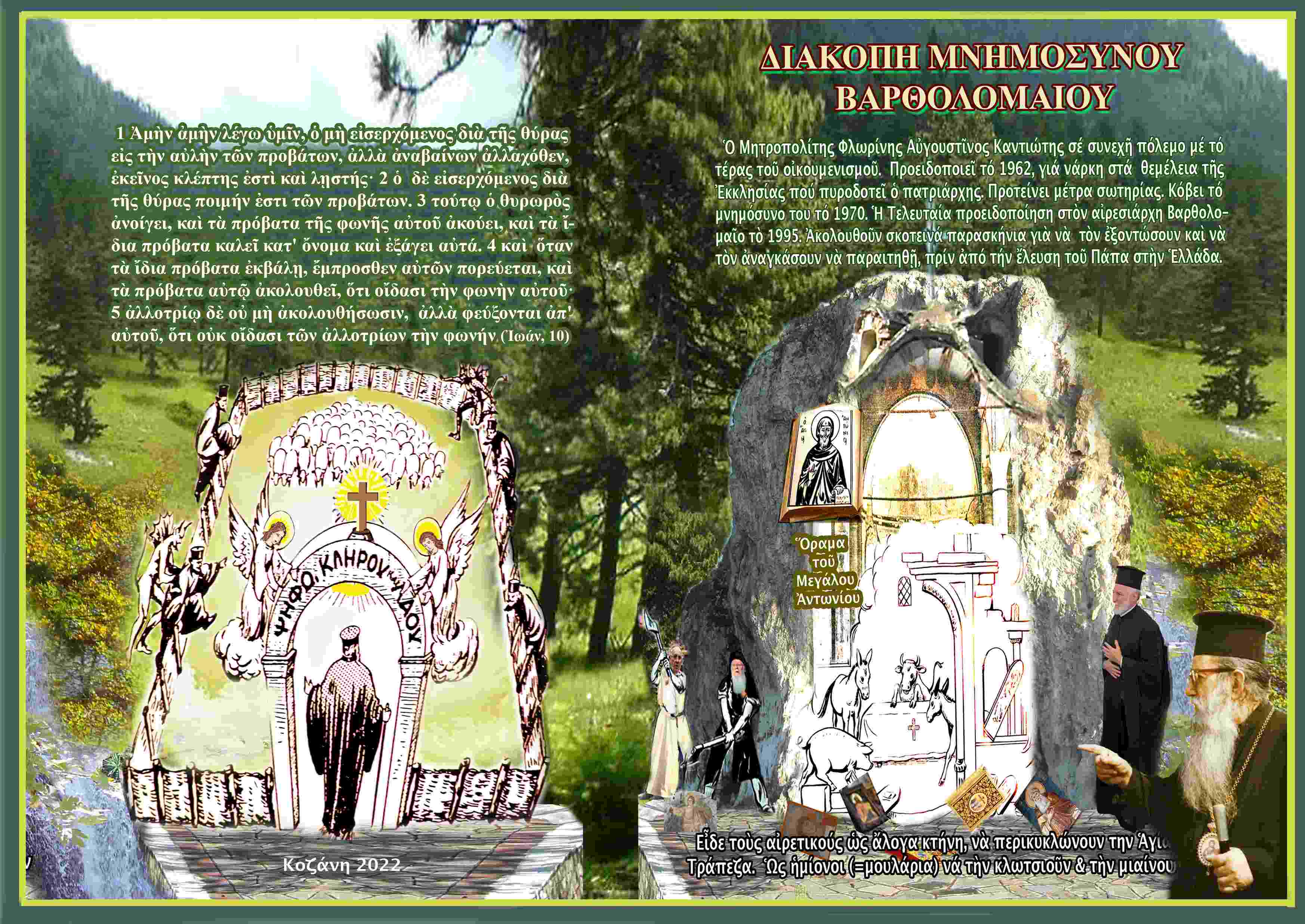NO to the Poope!
 Ιούλ 16th, 2010 |
Ιούλ 16th, 2010 |  Filed under: English
Filed under: English
Kyriaki – Sunday Sermonette
Issue No. 1136, Feb. 5
NO to the Pope!
 Last month (January 19, [2005]) we celebrated saint Mark bishop of Ephesus, Eugenicos, who said a “no” to the pope. Today is heard again a “no” to the pope. Some other saint said it, a great teacher and father of the Church, sacred Photios. Concerning him, we shall say a few words.
Last month (January 19, [2005]) we celebrated saint Mark bishop of Ephesus, Eugenicos, who said a “no” to the pope. Today is heard again a “no” to the pope. Some other saint said it, a great teacher and father of the Church, sacred Photios. Concerning him, we shall say a few words.
***
Photios the Great was born in the capital of the Byzantine empire, in the City, about A.D. 810. He lived and flourished in the ninth century – that is, from then 1,000 years and more have elapsed. He was cultivated in a good family environment.
The family plays a significant role. If we open the lives of the saints, we shall see that all these people whose feast-days we celebrate (Basil, Gregory, Chrysostom, Photios…) – all of them came from Christian homes. In the homes back then they said prayers, kept vigil (sleeplessness): the house would become a church. From such sanctified houses came forth the fathers. Then from the houses there came out angels; today demons come out. From where now shall fathers and teachers come out? You parents have great responsibility, who – I have said this thousands of times, I will take this to my grave – I say, you make your little children teachers, professors, officials, lawyers, doctors: who would devote himself to become a priest, a cleric, a missionary? And though Anglo-Saxons, French, Italians have sent down into Africa, to the wild places, their best children, we do nothing of the sort.
And sacred Photios, then, came from a christian home: his father was pious, his mother godly. He was also a noble according to the world. What does noble mean? Not that they possessed riches and offices. The greatest nobility is virtue. So they were virtuous and godly people. And just as our progeny (forefathers) used to say, “No gold upon the earth, or even also below the earth, possesses the value of virtue” (Plato’s LAWS 5,728A); the value of virtue outweighs the value of all the gold in the world. From within such a home came forth sacred Photios. His mother, Irene, and his father, Sergios, were martyrs of the iconoclastic period.
From a child Photios showed that he would become great. He was a child-miracle. He was not simply smart: he was a great genius. Great geniuses are called those people who are capable of delving deep into things and of solving the most difficult problems. Just as Olympus is the highest mountain, thus in like manner great geniuses are the great peaks of the intellect, of the intelligencia. Every 100-200 years there is born a great genius. Great men, high figures, as, for example, Homer, Plato, Aristotle, or in our epoch Einstein.
Sacred Photios was not only a great genius; he was also diligent. He was not like that lazy servant of the parable of the talents, who took the talent and hid it in the earth. Great Photios cultivated his talent. At night he slept for but a few hours. He studied. What did he study? The ancient authors and especially the fathers of the Church: Chrysostom, Basil, Gregory the Theologian…Above all he knew one book by heart: the holy Scripture. His genius and his diligence contributed in distinguishing him into one of the greatest men of humanity. He studied grammar, poetry, rhetoric, oratory, philosophy, also even medicine and every other science. He taught in Constantinople as a wise professor.
Early on he was taken on by the palace and took great positions in the court of Theophilos; he reached becoming the protospatharios, “first-swordsman” (general of the Emperor’s battalion), general secretary of the empire, and consul (parliamentarian).
Suddenly, at the age of 47 he became patriarch of Constantinople, during a difficult time of the Byzantine Empire. Did he want it? He did not want it. He took pleasure in books, the study hall. They took him from there as a layman and they ordained him. When he saw that they persisted, he did not sleep all night. He would weep and say: I prefer to die than to become…Not that he disdained the office of the priesthood, but because he knew how difficult it is for one to lift this responsibility, indeed in such a difficult time. Finally, though, he capitulated. He was ordained in one day, then a reader, sub-deacon, deacon, presbyter, and finally bishop and patriarch on Christmas day of 857. He did not become prideful; he kept himself humble-minded. He had humility. His biography says that whenever he heard that someone had sinned, tears would run from his eyes; he considered his own self to have sinned, and he lamented and begged God to forgive him.
Such was saint Photios, full of love and affection for his flock. But in the face of the enemies of the faith he was a lion. He struggled against the various heresies, and indeed the iconoclasts. He censured and rebuked the rich who were grabbers and unjust. He went against kings and emperors, and this cost him persecution. He had enemies. Who devoured him? priests, despots and monk-elders. They couldn’t take his tongue. All these previously mentioned ones allied themselves against him. They succeeded and brought over to their own side the kings and, and sacred Photios was twice sent into exile. The first time was in 867, during the reign of Basil the Macedonian, at the monastery of the “Protection” at the Thracian shores of the Bosporus; and they prohibited him from bringing anybody else with him. That which cost him dearly was that he was not allowed to have books near him, which always had been his companions. They dethroned him in 869. In 878 he returned for a second time to the patriarchal throne. And again though, they dethroned him in 886, during Leo the Wise’s reign, and they exiled him to a small island near Chalcedon, at the monastery of Ierias. There in exile he closed his eyes on February 6, 891.
Photios the Great said “no” against the pope, who wanted to subject the whole world under his authority. If we today are orthodox, we owe it to sacred Photios. The papists do not want to hear his name; for us orthodox he is a champion leader of the faith, just like Athanasios the Great, like Mark Eugenicos and so many other fathers.
***
Sacred Photios, my beloved, left us something precious, Orthodoxy. That is our greatest treasure. We do not understand this, we do not sense or feel it. A certain saint ascetic of our days said a prophecy: if we continue to live as we are living, a day will come when some shall be franks, others protestants, others masons, others Marxists and atheists, others shall be in different heresies and religions…The many unfortunately are indifferent. Let the Chiliasts or Millenialists [or so-called Jehovah’s Witnesses] increase, what do they care? Concerning these matters, let the priests and bishops attend to them…
It is not thus. You are an orthodox Christian? You must struggle for your faith and beg God. We have a debt. Our fathers toiled how much and sacrificed themselves for our faith! And we today shall become their imitators. When there appears at y our house a heretic and he knocks on your door, immediately inform the metropolis. Heretics and hetero-religionists now are obtaining priviledges [in Greece]: we orthodox will become second class Greeks. They insult Christ, God, Virgin Mary Mother of God, all the holy things, and nobody bothers them: if you say something to them and scold them, immediately they will sue you for insulting them. Our fatherland [Greece] has become an unfenced vineyard.
Where is Photios the Great now, where is Mark Eugenicos, where are the Basils and Chrysostoms, where are the martyrs and the confessors! We the few, as many of us who have remained and still believe, let us wake up and struggle for our faith. It is preferable for the sun to be extinguished than for Orthodoxy. One ancient figure used to say: My God, I thank you that you did not make me a tree, you did not make me a four-footed animal, but made me a man. And another would say: I thank you God because you made me a Hellene. We must thank God, because we were born orthodox.
May God, through the intercessory prayers of the super-holy Theotokos (God-bearer), of saint Mark Eugenicos,and of saint Photios, have mercy upon us and save us: amen.
+ bishop Augustinos
(This homily was originally delivered on Feb. 8, 1986, transcribed and abbreviated Feb. 5, 2005, and translated into the English language July 17, 2010, St. Marina’s, whose father was a fanatic pagan instrumental in her martyrdom, transl. by Stanley M. Sarantis)


Add A Comment
You must be logged in to post a comment.